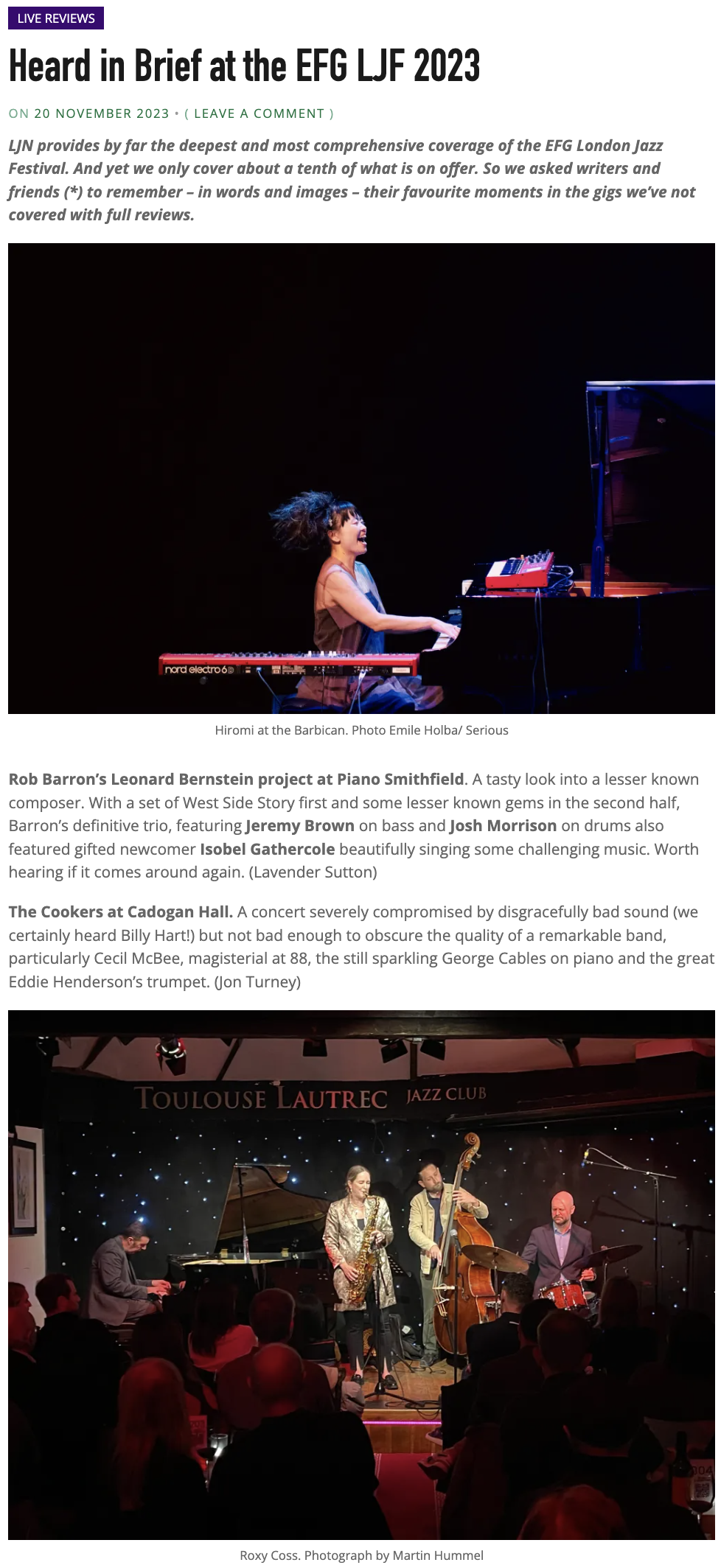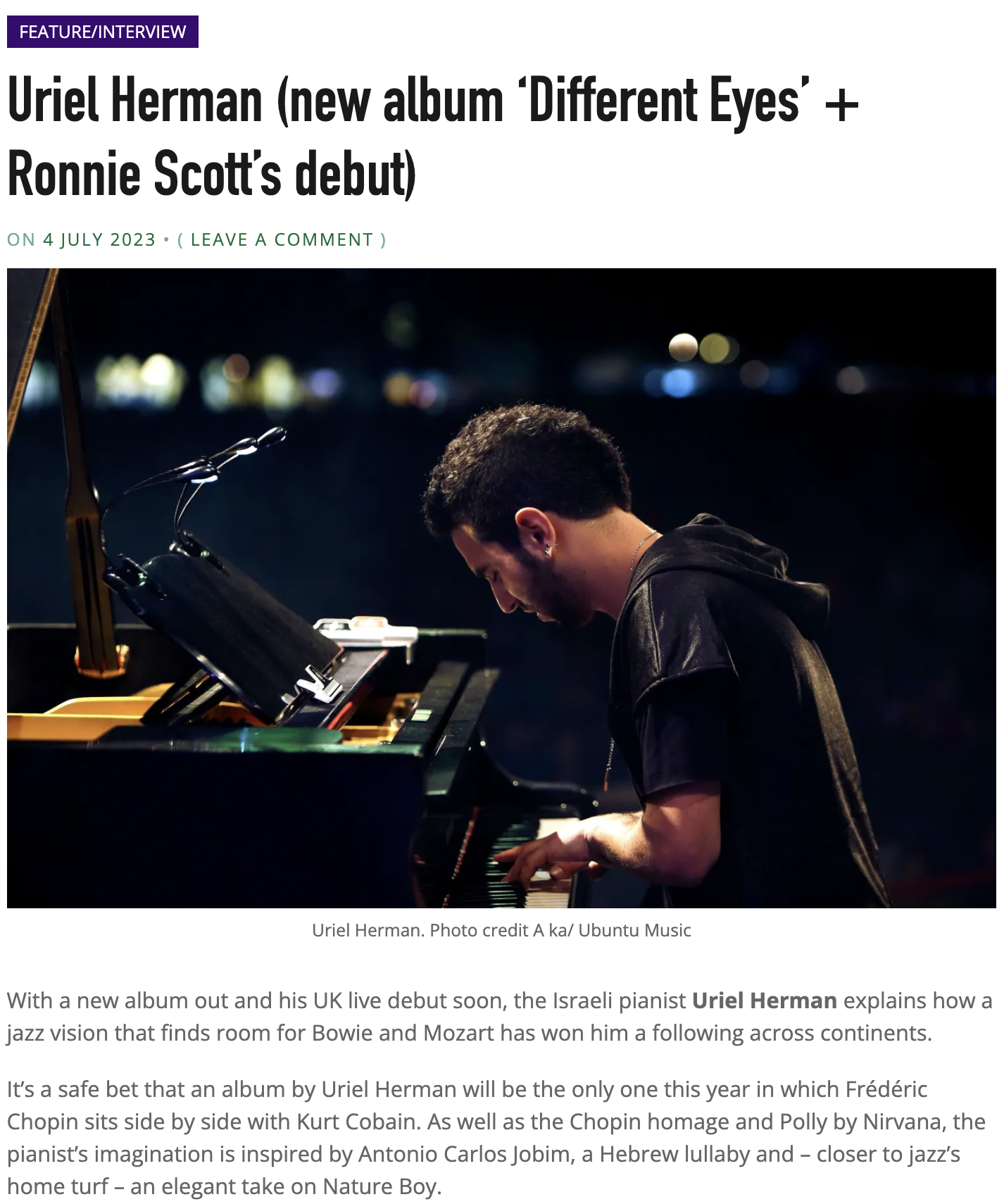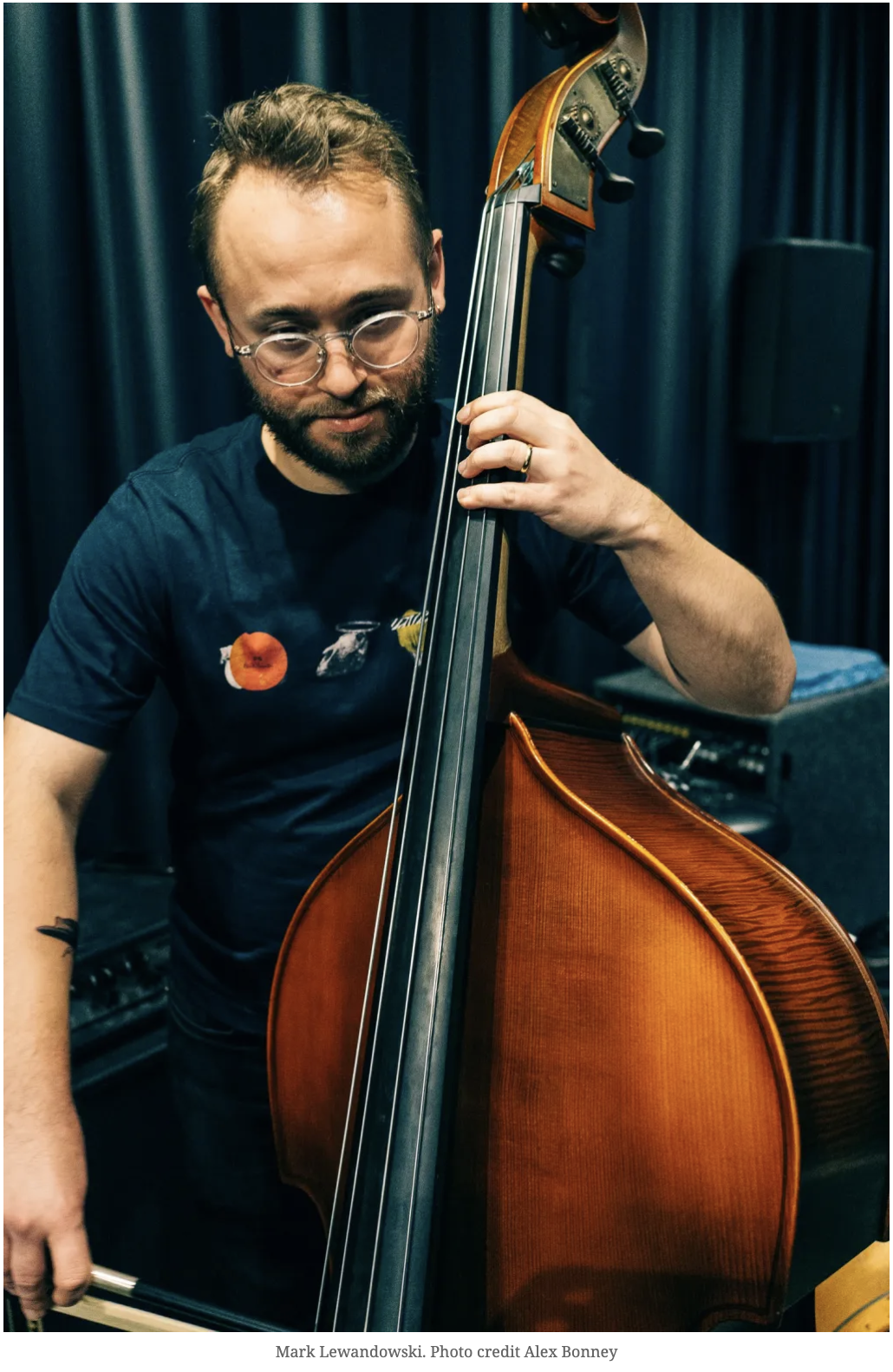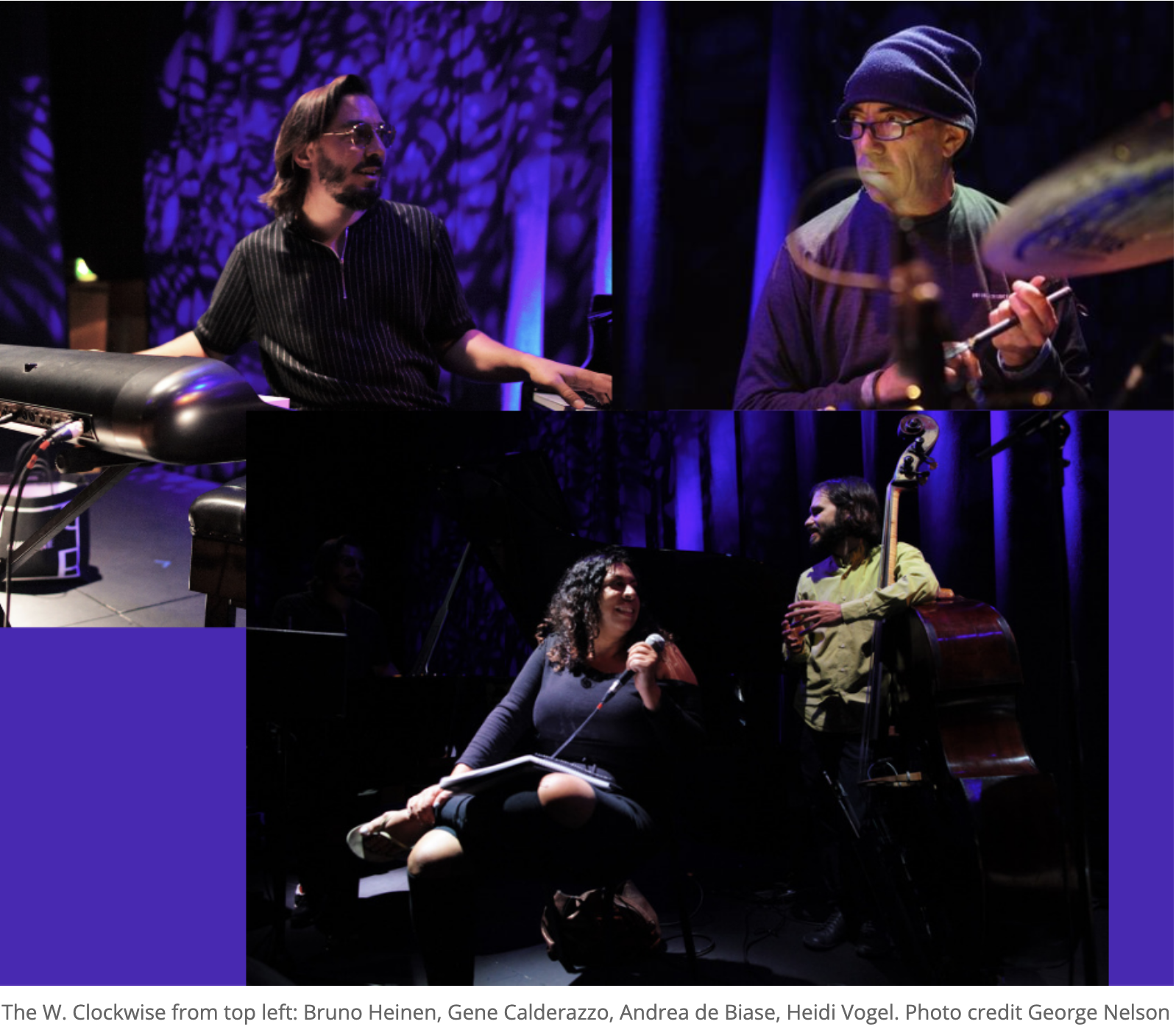HIGHLIGHT: Mark Lewandowski
REVIEW: Mark Lewandowski
FEATURE: Uriel Herman
FEATURE/INTERVIEW: Mark Lewandowski
PREVIEW: Heidi Vogel / The W
LIVE REVIEW: Bansangu Orchestra at the Spice of Life (EFG LJF 2021)
PROFILE: Martin Hummel
Sebastian Scotney writes about Ubuntu’s founder German Magazine, Jazzthetik, “What keeps him going? “The honest answer is that I feel like the happiest person in the world because I do exactly what I love. The world has been good to me and I want to give something back. I pursue my passion and can't think of anything better. "
Martin Hummel, the head of the record label Ubuntu Music, shows a row of pencils on the profile of his LinkedIn website. "Why these pencils?" I asked him. This is a reference to his earlier career, a homage to the symbol of the most important award ceremony in the advertising industry, namely the D&AD (Design and Art Direction) award. The American began his career in advertising in London in the 1970s. This was followed by an interlude in South Africa, hence the name Ubuntu. “Then I came back to London in 1989 - and that's where I stayed,” he says. Hummel is originally from Montclair, New Jersey. His ancestors emigrated from Hamburg in the 18th century. Even as a toddler he had a passion for jazz. Was there a key experience? “Yes,” he says, “an original edition of Miles Davis'Kind of Blue was sent to my parents. I still have the record today. "
This love of jazz led him to launch the Ubuntu label in 2016. One of his early successful projects was the first edition of Chet Bakers Live in London . The group's bass player had recorded the concerts the band gave in a long-forgotten club in Covent Garden on a cassette recorder. The trumpeter was in top form, and DOWN BEAT called the album one of the best historical reissues of 2017. But that wasn't the only success: Hummel's specialty is that he celebrates the American jazz tradition, especially with albums from the New York All-Stars the saxophonist Eric Alexander and the late pianist Harold Mabern from Memphis.
Hummel also supports musicians from the British scene, for example saxophonist Allison Neale. Her album Quietly There with Peter Bernstein was very well received by the critics. The saxophonist Paul Booth also works with the label. During his international tours, for example with Steve Winwood and Rod Stewart, he composed the music for the album Travel Sketches . One of these songs has been streamed more than two million times. Paul Booth is currently bringing out a new series with Ubuntu called The Secret Sessions .
How do people react when Martin Hummel tells them that he runs a jazz label? “They usually express their condolences to me,” he laughs. What keeps him going? “The honest answer is that I feel like the happiest person in the world because I do exactly what I love. The world has been good to me and I want to give something back. I pursue my passion and can't think of anything better. "
Sebastian Scotney's website londonjazznews.com was nominated for a Parliamentary Jazz Award in 2021.
Allison Neale's 'Quietly There' Chosen as One of Albums of The Year!
INTERVIEW: Hideaki Ura (EP ‘Intersection After Illusion’ for release on 15 January 2021)
Hideaki Ura is a pianist and keyboard player from Kyushu, the southernmost island of Japan. Born in 1994, he has just completed three years’ study at Berklee. His first EP will be released on Ubuntu Music early in 2021. LJN’s Sebastian Scotney interviews Hide.
LondonJazz News: What were your earliest musical experiences?
Hideaki Ura: I started learning the piano at Yamaha Music School when I was four years old because I saw my brother, who is seven years older than me, playing the piano. At first, I played classical music, but I started playing jazz music at the age of ten.
LJN: What was the music that first had a big impression on you?
HU: When I was ten years old, I listened to Bill Evans, Dave Brubeck and Gillock, an American music educator and composer. I studied Gillock’s book called “New Orleans Jazz Styles” and I became intrigued with jazz music. Gillock was the first person to expose me to the joy of this music genre. After that I listened to Hiromi and became more absorbed in jazz and progressive music. Their music was shocking to me. Until then I knew only classical and pop music, but they showed me the new world, jazz and rock. And that influence has affected me to today.
LJN: You started writing tunes in odd meters very early…
HU: Yeah, absolutely. The first song I composed was 5/4 in A section and 3/4 in B section. So, my mentor, Osamu Kajitani, told me to refer to “Take 5” by Dave Brubeck for A section and “Waltz for Debby” for B section. Surprisingly, Osamu taught Hiromi piano and composition when she was little. I was fascinated by her musicality, passion and creativity. You can see that her influence is very big for me. I focused on rock elements as well as jazz in her music and have listened to Michel Camilo, Ahmad Jamal, Return to Forever, King Crimson, Pink Floyd, Dream Theater, Animals as Leaders etc. on a daily basis. The musicians listed so far play a lot of songs in odd meters. I have been familiar with the songs with odd meters since I was little, so it is natural for me to compose odd meter songs. Actually, I don’t have the barrier between simple meters and odd meters.
LJN: You started studying economics at University… When did the decision come to concentrate on music?
HU: I had a vague desire to go to Berklee College of Music since I was little. That thought became concrete while I was in university in Japan. There are two reasons why I didn’t go to music college shortly after graduating from high school. First of all, I have a slightly difficult chronic illness called “Autoimmune Encephalopathy”. Simply put, this is a brain allergy. Factors such as low pressure cause me severe migraines and it brought paralysis to my right hand. I attended hospital for four years and was occasionally hospitalised. I took steroid pulse treatment and I tried to control the migraines with various medications. I had to give up music while I attempted to cure this. After a long period of treatment, the paralysis of my right hand was completely healed, and my condition became stable. My doctor allowed me to go to the United States. Today, I am not worried and can concentrate on music. Secondly, I wanted to value the relationship with people other than musicians because music is not created by only musicians. Music is created based on a lot of emotions. I believe that it is very important for musicians to interact with more people, experience more and enrich our minds. I became able to control my chronic illness to some extent and had four years of university experience. I then became passionate about music once again and decided to go to Berklee. I think it was time for me to go there.
LJN: What is the story of you getting to Berklee. Was your aim to study jazz or composition?
HU: There are many famous Japanese musicians who have graduated from Berklee like Toshiko Akiyoshi, Sadao Watanabe, Makoto Ozone, Hiromi and so on. They are great players and also composers. So, before enrolling in Berklee, I was going to choose jazz composition as my major. However, as soon as I entered Berklee, I felt uncomfortable with the difference in knowledge and musicality with my friends. Actually, I don’t know much about jazz standards because I have focused on composition. Also, when I imagine playing my compositions in a large ensemble, I heard the sound of an orchestra rather than big band in my brain. That’s why I chose a composition major with a focus on classical music. This choice made my range of music broaden. I learned orchestra music and contemporary music like Debussy, Ravel, Stravinsky, Ligeti, Reich and so on. Especially, due to the characteristic of my music, the influence on minimal music was very big. It was a different life than I had imagined before I entered Berklee, but it was a very important time.
LJN: You mention two teachers who made an impact: Arnold Friedman and Vadim Neselovskyi. Can you describe the influence they have had?
HU: Arnold Friedman was a professor of composition major and chair until 2016. The first time I met him was in a tonal harmony class. I also went to his office hour every week to learn the basics of tonal. I was impressed with his music and his attitude towards music, so I wanted to learn more under him (it’s difficult to take his classes, though). After that, I took his classes of “Writing for Strings” and “Choral Writing” and I took his “Directed Study”. This class is a private lesson of composition. He knew my musical background so well that he showed me a lot of musicians who match the characteristics of my music like Stravinsky, Ligeti, Reich and so on. He gave me a lot of advice on my string quartet and orchestra song I wrote for the first time.
Vadim Neselovskyi is a great pianist and composer and he teaches at Berklee. It’s very difficult to take his private lesson (he is one of Berklee’s most popular piano faculty members!), but I was able to take his lesson twice. I mainly learned composition in his lessons. I still remember his words in the first lesson. He said to me, “Hide, you are not Hiromi, Tigran or so. You should find out your own music and I’m here to help you do that.” In fact, I have never transcribed other musicians because I was very busy studying when I was little and I was afraid of losing my music. However, I only listened to certain musicians, so I imitated them without realizing it. From there I broadened my horizons and listened to more music to find my own music. He also showed me various ways to compose. It was all fresh to me, so I felt like I found a treasure every week. Arnold and Vadim took me to the next level. I am very grateful to them.
LJN: And among your student cohort Kevin Barber is a good friend. How did you start working together?
HU: My bassist, Kevin Barber, entered Berklee at the same time as me, fall 2017. I first met the drummer, Alex Silvergold (he also entered Berklee in Fall 2017), and he introduced me to Kevin. I had to look for the musicians who have the technical skills and are good at odd meters and sight reading to play “Capricious Illusion”. I composed 13/16 song for the first time at Berklee. And they are musicians who match my music perfectly. I have absolute trust in them. I played with Kevin at every recital in Berklee. Unfortunately, Alex dropped out of the music due to his sickness, but we still have a very good relationship. I would like to continue playing with Kevin.
LJN: Who are you currently working with and what kinds of music are you working on?
HU: I have been interested in remote collaborations since this pandemic happened. The other day I played my short song with my friend and great bassist, Tony Grey – Watch the collaboration HERE. I’m thinking of playing some short songs with him in the future. In addition, we will play together in my full-length album. And I played with Makoto Ishizaka, great bassist and composer – watch HERE. I didn’t play much with acoustic bass and this music is classical mood, so it was a lot of fun. Devin Greig, Save Us From The Archon, is also my friend and great drummer. He can play jazz, fusion, rock, prog, metal and so on. We just clicked through Instagram and we are planning to play together. I can’t wait to play with him actually. And the super guitarist, Yvette Young, has been my good friend since I met her last year. If our schedules permit, I would like to play with her. I believe it is not far in the future. I have been more interested in classical music, math rock, djent and metal. Now that I have time, I want to spend more time getting into these genres of music.
LJN: Do you feel your music is still developing?
HU: Yes, of course. I feel I was able to find the music I feel most comfortable with. But I feel that my music can develop further. As mentioned earlier, I learned a lot of music in my three years at Berklee. But it’s only three years. That is still not enough time to understand them. I’m sure that there are many more discoveries I don’t know about. I have to listen to and learn music every day. And there is countless music in the world. This means that I can incorporate that music and develop my own music. I believe that when the people lose their inquisitive mind, not just their music but their growth stops. I am still young and have just set out. I always want to be involved in music and work hard to develop my music with this inquisitiveness and curiosity.
LJN: Are odd meters something you as a musician count… or feel?
HU: I just feel it, not count it. Of course, it may be necessary to count depending on the section. It is natural for me to play or compose the odd meter songs. And time signature is just one element of music. We don’t have to be obsessed with it. The same is true for other factors. Music evolves with the emotions and passions of the time, especially in the improvisation section. Focusing on the time signature and speaking concretely, the way the time signature is divided changes. Always.
LJN: And do you think the listener needs to understand the complexity, or just the feeling?
HU: I think that it is not necessary for all listeners, including me, to understand the complexity. And also the feeling, too. It’s true that musicians have some feelings about their songs, but I don’t think the listeners need to understand them perfectly. The feelings that musicians put into their songs are one indicator. I think that music will grow further as each story is created by the listeners. I always cherish how I felt when I listened to the song.
LJN: How did Ahmad and Laura (Jamal) first become aware of you?
HU: When I was selected as a 2019 Yamaha scholar by Yamaha Music Foundation, I started thinking about things after graduating from Berklee. So, I sent an email to Ellora Management with my songs attached to build the relationship with them. I thought I would not get a reply from Ellora Management, but surprisingly Laura replied to me right away. And she said that she liked my music. We didn’t have much interaction after the email, but she contacted me again during the lockdown in March. And she told me about Martin Hummel, Ubuntu Music. That’s why I built the relationship with Ubuntu Music. I think I was very lucky because I thought I had to go back to Japan after graduating in May due to this insane pandemic. Probably in May, Ahmad listened to my music when Laura happened to listen to it. And he liked my songs and gave me a message. I was very glad because, you know, he has made exceptional jazz music and influenced many musicians. I am no exception. A lot of miracles have happened to me!
LJN: What comes next?
HU: As in the Ubuntu Music announcement, Ellora Management and Ubuntu Music have big plans for my management. And Ahmad Jamal has expressed an interest in producing my next full-length album. I composed a lot of songs for this plan. The three songs included in this EP were recorded while at Berklee, but I will re-record these same three songs for my full-length album. So, listeners can enjoy comparing my performances as a student with my current performance. I think it’s just a timing issue. This pandemic has hurt many people. I hope people all over the world can stay healthy and everything will get better soon. And I want to do music projects as soon as possible.
LJN: Do you have a big ambition, or some idea of what “success” is or will be?
HU: First of all, I realised once again how happy it was to play music during this pandemic. I want to play music with gratitude. Currently, I mainly perform or compose the songs in small ensembles such as a trio or quartet with guitar. I want to play or compose the songs with strings or large ensemble like an orchestra. I think this will take a lot of effort and time, but I hope to achieve it someday. And I would like to collaborate with other creative areas like art, literature, animation and so on. I don’t want to be categorized as one music. I have always pursued new music. I aim to establish my own music genre. Ideally for me, when the listeners listen to my music, they can recognize that it is me who is composing or playing.
PP features are part of marketing packages












































